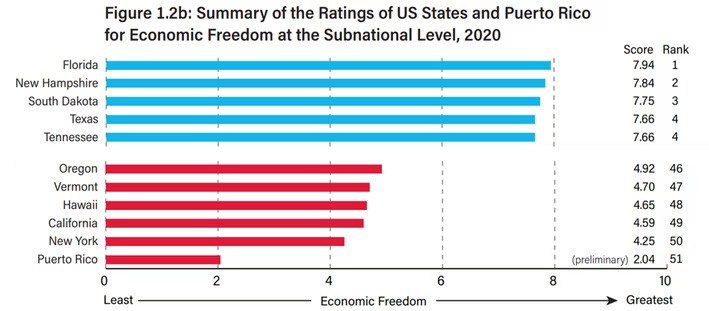 People point to tax burdens and over-regulation as the reasons for economic decline. But the reality is that high government spending is the precursor to heavy taxes and regulation. Look no further than the Fraser Institute’s latest report to see how states rank for economic freedom based on government spending, taxes, and labor market regulation. The five lowest-ranking states for economic freedom are Oregon (46th), Vermont (47th), Hawaii (48th), California (49th), and New York (50th). The most economically free states are Florida (1st), New Hampshire (2nd), South Dakota (3rd), Texas (4th), and Tennessee (4th). I recently interviewed Dr. Dean Stansel, contributing author of the report, about his findings. He said, “anytime the government takes from you, that’s an infringement on your freedom.” And he’s right; if the government doesn’t spend, it doesn’t need to tax and it wouldn’t fund bureaucrats to regulate.
The data in the report are two years behind, so these findings reflect 2020, which include only a few months of the pandemic-related shutdowns and excessive policy restrictions. Given the continued excess of spending since then, there is good reason to believe that the scores will look worse in the following reports, even if the relative rankings don’t change much. The lowest-ranking states for economic freedom spend excessively and raise taxes to fund self-imposed expenses instead of limiting spending to what the average taxpayer can afford. Given this, there’s no surprise that New York is 50th. The state’s extreme spending has led it to what’s been estimated as a $10 billion deficit. It also ranks last in individual income taxes and second to last in property taxes, according to the Tax Foundation’s latest rankings of state business tax climate, which ranks the state 49th. Florida, on the other hand, ranks first in economic freedom with no personal income taxes, and ranks fourth among states in business tax climate. The trend is similar among the more and less economically free states: those with lower spending, taxes, and regulations boast better economic freedom rankings, while states like New York and California with egregious tax burdens and regulations are the least economically free. According to Stansel, the top states remained at the top even after pandemic-related shutdowns slowed state economies because they more successfully kept spending, taxes, and labor market regulations under control. But the real question is: why should we care about economic freedom? Economic freedom is the measure of how much people can decide for themselves on how to meet their needs, given that we live in a world where resources, especially time, are scarce. In free-market capitalism, people own and direct the means of capital and labor. But with socialism, politicians own and direct the means of capital and labor. Government interference, whether in the form of excessive government spending that distorts economic activity, or heavy taxation and barriers to work and capital growth through regulation, reduces means and opportunities for voluntary exchange that supports greater human flourishing. The more regulations state governments impose, the less incentive people have to work and be entrepreneurial. The more the state taxes, the less money people have to contribute to the savings, investment, and capital growth that provides for the wealth of nations’ investment. People are fleeing less economically free states toward the freer. There is greater potential for personal flourishing where there are fewer barriers to individual decisions that support economic growth. While tax and regulation reforms are reasonable steps for states seeking more economic freedom, it won’t help much if state spending remains unrestrained. According to the late economist and originator of the ideas for the EFNA report, Milton Friedman, the ultimate burden of government is not how much it taxes, but how much it spends. Balancing the budget is one thing, but that’s a short-term fix for an ideological problem too many states seem to have made, about the expanded role of government. Taxpayers must fund government programs when instead, the government should be limited to its constitutional roles so more money stays in the pockets of taxpayers and the productive private sector. Until states decide to impose a strict spending limit based on a maximum rate of population growth plus inflation, cut and eliminate burdensome taxes, and scrap burdensome regulations, economic freedom will continue to collapse. And, more importantly, people will suffer. States must not let that happen. Instead, state governments should get out of the way so that economic freedom can empower people to prosper. Originally published at AIER.
0 Comments
Leave a Reply. |
Vance Ginn, Ph.D.
|


 RSS Feed
RSS Feed